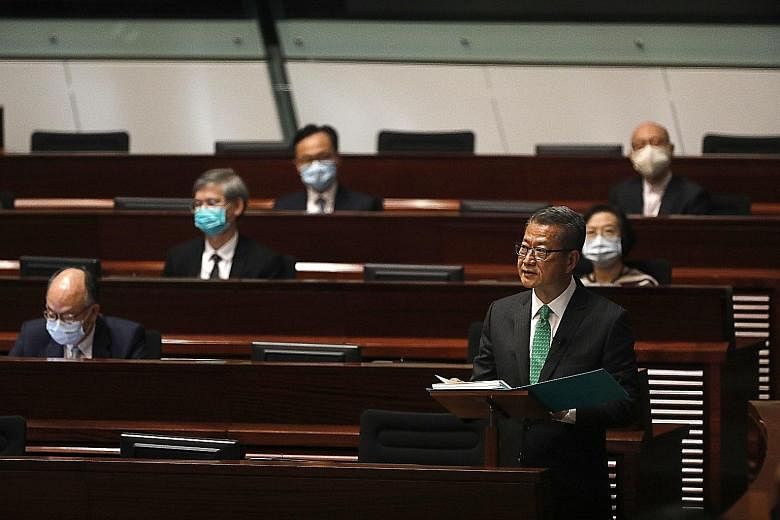Hong Kong's finance chief has unveiled a HK$120 billion (S$20.4 billion) blueprint to stabilise its badly battered economy, which includes loans for the jobless and vouchers to fuel consumption, even as the budget deficit hits a record high.
"Hong Kong will record a deficit for a number of years after achieving a surplus for 15 years," Financial Secretary Paul Chan said in his budget speech yesterday.
He said the budget deficit for the current 2020 financial year ending March 31 is estimated to peak at HK$257.6 billion - coming in less than a previous estimate of HK$300 billion - while fiscal reserves are expected to be HK$902.7 billion by the end of next month.
"In the past year, we have increased government expenditure substantially to combat the epidemic and roll out relief measures, which resulted in our fiscal reserves dropping sharply in two years from the equivalent of 23 months of government expenditure to 13 months," Mr Chan said.
While a pickup is expected in government revenue in the coming 2021 financial year, he still expects a fiscal deficit of HK$101.6 billion - equivalent to 3.6 per cent of gross domestic product - due to the counter-cyclical fiscal measures and the continued increase in recurrent expenditure.
Hong Kong's economy is expected to grow by 3.5 per cent to 5.5 per cent this year, but Mr Chan warned that the progress of economic recovery depends on developments in the Covid-19 pandemic.
Last year, Hong Kong's economy shrank 6.1 per cent - the largest annual decline on record and also the first time the city registered two consecutive years of contraction - while the unemployment rate peaked at 7 per cent.
The counter-cyclical measures laid out in the speech include spending vouchers of HK$5,000 for eligible residents and HK$15 billion of guaranteed loans for the jobless at a fixed interest rate of 1 per cent.
Proposals to reduce profits and salaries taxes in the year of assessment 2020/21 by 100 per cent, capped at HK$10,000, will help 128,000 businesses and 1.87 million taxpayers.
The government will earmark HK$934 million to boost tourism - one of the hardest-hit industries during the pandemic.
To boost revenue, Mr Chan proposed raising the stamp duty on stock trading to 0.13 per cent, from 0.1 per cent.
The announcement triggered shares of the Hong Kong bourse operator to plunge 8.8 per cent by the end of trading yesterday, while the Hang Seng was down 3 per cent.
Businesses and individuals, however, will be spared hikes in profits and salaries taxes.
Mr Chan also said that the government will rein in spending by freezing new hires in the civil service and cutting departmental expenditures.
Chief Executive Carrie Lam said the budget's continued investment in innovation and technology will position Hong Kong well in the development of an international innovation and technology centre in the Guangdong-Hong Kong-Macau Greater Bay Area.
Describing Mr Chan's task as "very challenging", PwC Hong Kong tax partner Agnes Wong said: "If you look at this year's budget, the other revenue stream comes from the issuance of the bonds. So issuing more bonds - the green and silver bonds - that probably can help with the revenue."
Hong Kong plans to issue green bonds regularly and expand the scale of the Government Green Bond Programme.
Mr Chan has proposed doubling the borrowing ceiling of the programme to HK$200 billion to allow for further issuance of green bonds, totalling HK$175.5 billion within the next five years.
The government will also issue no less than HK$24 billion silver bonds and no less than HK$15 billion iBonds this year. Both are higher-interest bonds that protect against inflation, the former being only for senior citizens.
Ms Wong stressed that as Hong Kong competes with rivals, such as Singapore, in areas like trading, intellectual property and as a regional hub for family offices, greater tax incentives will help to attract more foreign investments.


